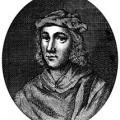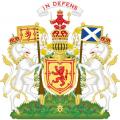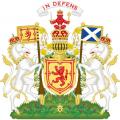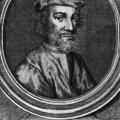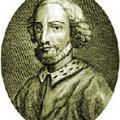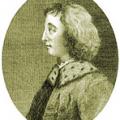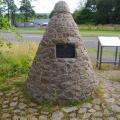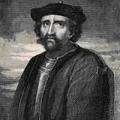Categories
Most Liked
Posted on July 17, 2013
by Amanda Moffet
by Amanda Moffet
Posted on May 12, 2013
by Chas Mac Donald
by Chas Mac Donald
Posted on August 29, 2013
by Amanda Moffet
by Amanda Moffet
Posted on February 7, 2013 by Donald | 2 views | comments
Domnall mac Causantín was King of the Picts or King of Alba in the late 9th century. He was the son of Causantín mac Cináeda.
Domnall became king on the death or deposition of Giric mac Dúngail, the date of which is not certainly known but usually placed in 889.
It is thought that he was killed ...
Posted on February 7, 2013 by Donald | 1 views | comments
Causantín mac Áeda was king of Alba from 900 to 943. He was the son of Áed mac Cináeda and first cousin of the previous ruler, Domnall mac Causantín. Causantín mac Áeda's reign is the second longest before the Union of the Crowns in 1603, exceeded only by William the Lion.
Posted on February 7, 2013 by Donald | 2 views | comments
Máel Coluim mac Domnaill was king of Scots, becoming king when his cousin Causantín mac Áeda abdicated to become a monk. He was the son of Domnall mac Causantín.
In 945 Edmund of Wessex, having expelled Amlaíb Cuaran (Olaf Sihtricsson) from Northumbria, devastated Cumbria and blinded two sons of ...
Posted on February 7, 2013 by Donald | 0 views | comments
Idulb mac Causantín was king of Scots from 954. He was the son of Causantín mac Áeda.
Idulb is an Old Irish name derived from either the Old Norse name Hildulfr or the Old English name Eadwulf. Idulb was later rendered Indulf under Old French influence.
John of Fordun and others supposed that Id...
Posted on February 7, 2013 by Donald | 0 views | comments
Dub mac Maíl Coluim was king of Alba. In older histories his name may be found anglicised as Duff; the modern Gaelic version is Dubh, which has the sense of dark or black. It may be that Dub was an epithet, as the Duan Albanach refers to him as Dubhoda dén, Dubod the vehement or impetuous. He was ...
Posted on February 7, 2013 by Donald | 1 views | comments
Cuilén mac Iduilb was king of Alba from 967 to 971. He was one of three known sons of Idulb mac Causantín, the others being Amlaíb and Eochaid.
It is supposed that Cuilén was implicated in the death of his predecessor Dub mac Maíl Coluim, who had defeated Cuilén in battle in 965.
The Chronicle o...
Posted on February 7, 2013 by Donald | 1 views | comments
Cináed mac Maíl Coluim was King of Alba. The son of Máel Coluim mac Domnaill, he succeeded Cuilén mac Iduilb on the latter's death at the hands of Amdarch of Strathclyde in 971.
In 973, the Chronicle of Melrose reports that Cináed, with Máel Coluim mac Domnaill, the King of Strathclyde, "Maccus, ...
Posted on February 7, 2013 by Donald | 0 views | comments
Causantín mac Cuilén was king of Scots from 995 to 997. He was the son of Cuilén mac Iduilb.
Causantín became king upon the death of Cináed mac Maíl Coluim, supposedly killed by Finnguala, daughter of Cuncar, Mormaer of Angus, a killing with which Causantín is associated in several accounts. John...
Posted on February 7, 2013 by Donald | 0 views | comments
Cináed mac Duib (Kenneth III) was King of Scots from 997 to 1005. He was the son of Dub mac Maíl Coluim.
The only event reported in Cináed's reign is the killing of Dúngal mac Cináeda by Gille Coemgáin mac Cináeda, by the Annals of the Four Masters s.a. 999. It is not certain that this refers to ...
Posted on February 7, 2013 by Donald | 1 views | comments
Máel Coluim mac Cináeda (Malcolm II) was King of Scots from 1005 until his death. He was a son of Cináed mac Maíl Coluim; the Prophecy of Berchán says that his mother was a woman of Leinster and refers to him as forranach (the Destroyer or Avenger).
To the Irish annals which recorded his death, Má...
Posted on February 7, 2013 by Donald | 1 views | comments
‘Many a white-headed champion fell into rank around your banner, and many a handsome youth was mangled under horses' hooves...' 'Song to Sir Hector', Eachan Bacach
The execution of King Charles I changed the whole course of the Civil war. The Scots recognized his successor. Cromwell pushed North ...
Posted on February 7, 2013 by Donald | 23 views | 1 comments
Like much Scottish history the tale of Rob Roy is shrouded in mystery and intrigue. The people of the time were mostly illiterate and stories of the famous battles and legendary characters were mainly passed down the generations by word of mouth, embellished as they went, to provide the great tales ...
Featured Articles
Most Discussed
Posted on July 16, 2013
by Amanda Moffet
by Amanda Moffet
Posted on February 6, 2013
by Donald
by Donald
Posted on July 17, 2013
by Amanda Moffet
by Amanda Moffet


 View More
View More View Less
View Less
